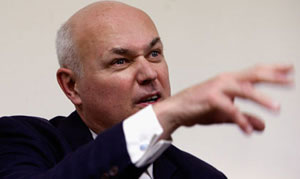 The bedroom tax is just one part of the wholesale attack on benefits that is being ratcheted up from the beginning of April. The council tax benefit cut will affect at least 670,000 working-age recipients in both social and private accommodation including an estimated 162,000 low-paid workers. They will have to find between £100 and £250 per year. This will be on top of any bedroom tax for which they may be liable, or on top of any rent they have to pay because of last year’s cuts in local housing allowance for those in private rented accommodation.
The bedroom tax is just one part of the wholesale attack on benefits that is being ratcheted up from the beginning of April. The council tax benefit cut will affect at least 670,000 working-age recipients in both social and private accommodation including an estimated 162,000 low-paid workers. They will have to find between £100 and £250 per year. This will be on top of any bedroom tax for which they may be liable, or on top of any rent they have to pay because of last year’s cuts in local housing allowance for those in private rented accommodation.
The three-year 1% annual limit on benefit increases will mean a substantial cut in real terms for all claimants with inflation running at 3%; it affects 9.5 million households of which 7.0 million have someone in work. On top of this, the capping provisions of the Welfare Reform Act will come into effect. The maximum benefit will be set at £500pw for families and £350pw for single adults. 56,000 families, half of them in London, will lose an average of £93pw. It will also mean the extension of Atos-run tests to drive people off Disability Living Allowance on to much lower Personal Independence Payments with the aim of cutting such expenditure by 20%.
Stigmatising the poor is part and parcel of the ruling class offensive: stories of two or three generations of worklessness, of 120,000 families characterised by drug addiction, alcohol abuse and crime, a culture of ‘disruption and irresponsibility that cascades through generations’ (David Cameron, November 2011), of families where the ‘prevalence of child sexual and physical abuse was striking and shocking’ (Listening to troubled families, July 2012) become accepted as the truth. Back in June 1997 Tony Blair claimed that ‘behind the statistics lie households where three generations have never had a job.’ No one has ever found such a household; this did not stop Minister of State Chris Grayling claiming two years ago that there were four-generation workless households. Work and Pensions Secretary Iain Duncan Smith claims that ‘about 1.4 million people spent almost ten years on out-of-work benefits under the last government’; the imlpication is that they were all unemployed. In fact the numbers are vanishingly small – according to the Department of Work and Pensions, about 0.1% of all claimants; the average time people spend on Job Seeker’s Allowance is 13 weeks.
It is the same with housing benefit: anecdotes and misinformation and downright lies are presented as the norm: stories of households receiving over £100,000 per annum receive widespread publicity. Yet of five million households receiving some form of housing benefit, only 3% received more than £200 per week, and 0.04% more than £30,000 per annum. The average award was £85 per week, and the majority of families received less than £4,000 per annum. Yet the government continues to purvey the myth that spending on state welfare is out of control and responsible for the national debt, Duncan Smith claiming ludicrously that ‘why we got into such problem in debt and the deficit was that in chasing the [child poverty] target it got more and more difficult and more and more money had to be spent.’ In fact spending on welfare averaged around 11% of GDP for many years and only rose to over 13% following the 2007/08 banking crisis. With Labour enthusiastically supporting the division between ‘workers’ and ‘shirkers’, anti-cuts activists need to keep aware of the need to fight this ruling class ideological offensive.
Robert Clough




